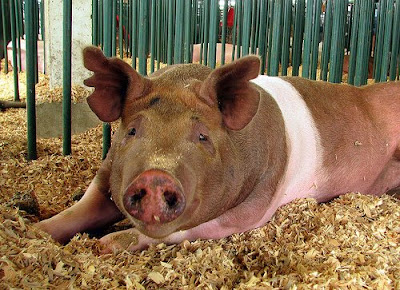Look at that face. The last thing this colossal oinker wants is for you to come down with a nasty case of swine flu, but sadly the new look for Spring might turn out to be those trendy blue or white masks everyone on the news is wearing. The US declared a public health emergency--just a routine declaration to enable release of federal funding, according to Homeland Security Sec. Napolitano--over the weekend; so far the death toll from the A (H1N1) strain of flu virus stands at more than 100. The WSJ has a nice primer here.
Of course Roche and GSK got a stock boost on the flu scare, as the makers of Tamiflu and Relenza saw shares jump in early trading on Monday, Reuters reports. And we've already seen a smattering of press releases for various anti-swine flu masks and disinfectants, demonstrating that preparedness borne from previous SARS and avian flu scares is not limited to government health organizations.
Speaking of preparedness, we were all set to link around to the mountains of data coming out of the European Association for the Study of the Liver this morning, might as well get to it, swine flu be damned.
So, while you were getting eliminated ...
- Roche, Intermune and Pharmasset said over the weekend that their interferon-free combo study of an HCV protease inhibitor plus polymerase inhibitor was a success. The 14-day Phase I INFORM-1 study was the first trial to combine two direct acting antivirals without standard interferon plus ribavirin therapy. Most importantly for an early trial, there were no serious adverse events reported.
- Swinging now from early- to late-stage analysis, Vertex said it saw 'unprecedented' sustained viral response (SVR) rates in patients treated with its protease inhibitor telaprevir who had failed previous rounds of therapy. PROVE-3 is a Phase IIb trial of telaprevir plus interferon/ribavirin who did not respond to IFN/ribavirin alone, a difficult-to-treat population.
- Also noteworthy from EASL over the weekend: Human Genome Sciences reported final results from its Phase III studies of the long-acting interferon Albuferon. That the drug met its non-inferiority endpoint has been known since last month, though analysts had been hoping for better efficacy.
- Leaving the liver now, Ben Goldacre tackles the often sketchy practice of clinical trial subgroup analysis in his latest Bad Science column in the Guardian.
- Your weekly dose of the good sheet: Matt Hobbs reports in the Pink Sheet that FOBs legislation may be coming off the boil thanks to competing priorities in Henry Waxman's Energy and Commerce committee ($).
- The New York Times reports on the growing tension between primary care docs and specialists, as Obama administration officials try to walk the line between easy access to health care and increased costs of that care.
- Bayer and Onyx report disappointing news for Nexavar, which failed a Phase III trial in chemotherapy naive stage III/IV melanoma patients. Interim analysis from a data monitoring committee suggested the trial would not meet its goals. The news marks the second high-profile melanoma failure in three months, following Synta/GSK's elesclomol setback in roughly the same patient population.
- Thanks to those who expressed sympathy after the Flyers succumbed to Penguin Flu this weekend. We weren't all that confident of victory for the orange and black (hence no 'Flyers in five' predictions this year) but it's disappointing nonetheless.



No comments:
Post a Comment